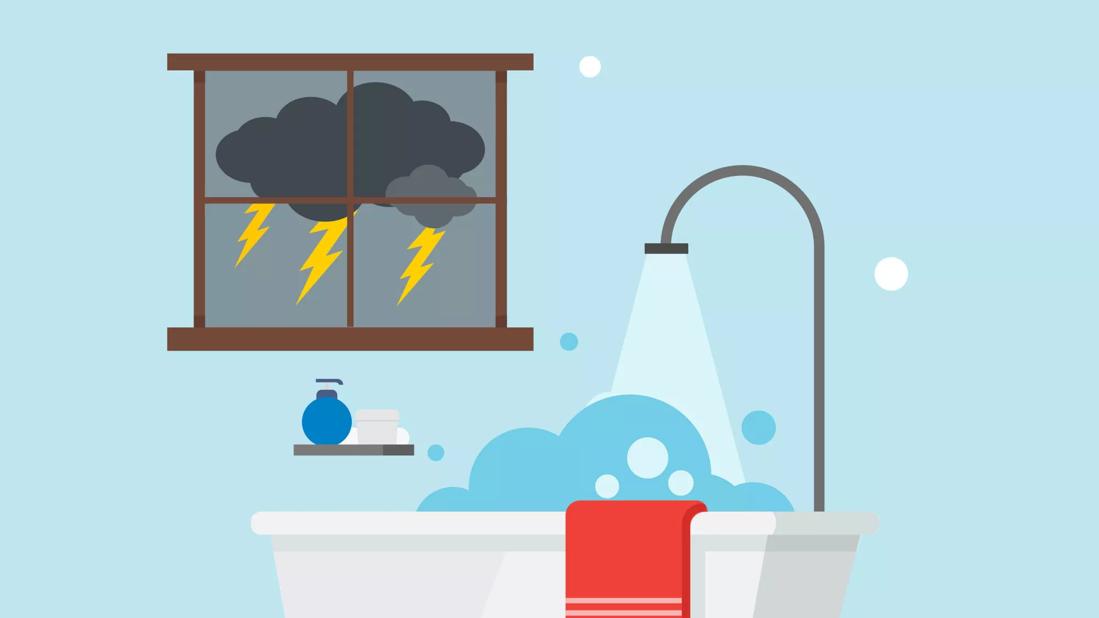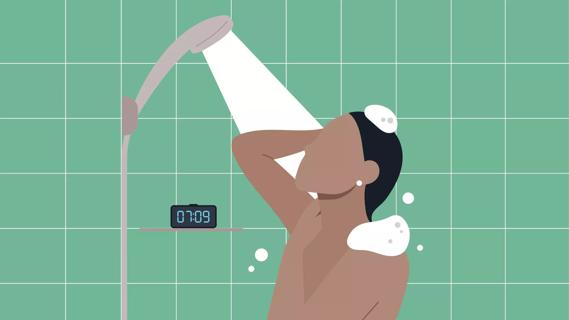Lightning can strike indoors, even with plastic plumbing — and that includes in the shower

About 40 million lightning strikes hit the ground in the United States every year.
Advertisement
Cleveland Clinic is a non-profit academic medical center. Advertising on our site helps support our mission. We do not endorse non-Cleveland Clinic products or services. Policy
But according to the U.S. Centers for Disease Control and Prevention (CDC), there’s less than 1 in 1 million chance of being struck by lightning directly or indirectly. While rare (and even with 90% of lightning strikes being nonfatal), being struck by lightning can still lead to serious injuries and even lifelong debilitation. And if you think you’re insulated from a lightning strike indoors, think again: One-third of all lightning injuries occur indoors.
For instance, is it safe to shower in a thunderstorm? Can you use a landline telephone while indoors when it’s thundering outside? And what about the dishes left in the sink — should they wait until after the storm has passed?
We’ve all heard advice on these subjects at one point or another, but what is fact and fiction? Emergency physician Christopher Bazzoli, MD, FAWM, DiMM, answers some of these striking questions so that we can all be a bit safer in our homes.
The idea that you’re protected from a lightning strike because you’re indoors might make you feel safe enough to take a shower during a thunderstorm … but you’d be shockingly wrong.
When a thunderstorm is raging, lightning can strike a house and travel through its plumbing to strike you, making showering during a thunderstorm an unsafe practice. This is true even if you have plastic pipes because water is a good conductor of electricity.
Advertisement
“The current can easily travel along those pipes, and when it’s looking for a way out at the end of the line, it can jump and strike a person from the showerhead or faucet,” explains Dr. Bazzoli.
That’s also true if you’re bathing, washing dishes or washing your hands — all unsafe activities to do during a thunderstorm.
“The good news is that conduction strikes in a home are typically far less severe than strikes outside because electricity needs to travel farther and has more opportunities to divide and dissipate in other directions when you’re inside,” he adds.
When lightning strikes your house, it’s going to follow the path of least resistance. That means it can travel along piping and electrical lines in an effort to reach its destination. That makes interacting with objects that are plugged into the wall (like landline phones) and with your plumbing unsafe behaviors to do during a thunderstorm.
“When thunder roars, go indoors and hangout with a book or engage in an activity that’s not connecting you to electrical and plumbing systems,” advises Dr. Bazzoli.
To protect yourself from a lightning strike, refrain from showering for at least 30 minutes after the last thunder roll you hear.
“The most dangerous times for a lightning strike are immediately before and immediately after the storm,” says Dr. Bazzoli. “Lightning strikes can commonly extend 10 miles out from a thundercloud. So, if you’re able to hear thunder, you’re still within that strike distance.”
If you’re out in the woods or the country and staying in a tent or primitive shelter, you’ll want to find a more protective solution by seeking shelter inside a building or vehicle. A tent offers no protection from lightning, and distributes the current to the ground unevenly, allowing the electricity to jump through the space.
You also want to make sure you’re not standing under any tall objects like trees because this is a common way of being struck. If you have an RV, which tend to have their own electrical and plumbing systems, you want to make sure you follow the same rules you would if you were inside of a home: Don’t shower during a storm and stay away from wired electrical systems.
But I live in an apartment complex or high-rise apartment building — shouldn’t I be safe?
You may be wrong to think so, too.
Commercial buildings tend to be taller but often have some lightning mitigation system in place like lightning rods. But the same rule applies to larger buildings and apartment complexes as a house: If struck by lightning, it will find its way to a grounding point and anything in that path of travel can be at risk.
Advertisement
“In a larger apartment building or complex, there are more avenues for the current to dissipate through and find its way to lower charge grounds,” clarifies Dr. Bazzoli. “There’s less risk in a big building high rise, but that doesn’t mean there’s no risk.”
“In taking the path of least resistance, openings and orifices like your eyes, ears and mouth are easier entryways for lightning to travel through than going through a thick bone like your skull,” Dr. Bazzoli continues.
That makes injury to your eyes, ears and mouth more common when you’re struck by lightning. And you can be struck by lightning directly or indirectly if you come into contact with a surface or object that’s been struck. That’s why you never want to lie down in a thunderstorm because you increase the amount of surface area you’re in contact with and then increase the likelihood of current traveling through you.
If you’re struck by lightning, you can experience a number of injuries that include:
Advertisement
Lightning also heats up the air it passes through to more than 50,000 degrees Fahrenheit (27,760 degrees Celsius) — five times hotter than the surface of the sun — so, it’s no wonder these injuries are often severe.
“Sometimes, a lightning strike can have so much current that if you’re wet, it may vaporize the liquid on your skin into steam and superheat it, which can lead to steam burns,” states Dr. Bazzoli.
If you or someone have been struck by lightning, the most important thing you can do is get to safety and then call 911 or your local emergency services hotline.
Despite the common saying, lightning can strike the same place more than once, and because lightning can short-circuit your internal electrical systems that allow your heart to beat and your lungs to breathe, it’s critical that you seek help immediately and get those systems going as soon as possible.
“Once you call 911, if it’s safe to do so and if you’re trained, initiating CPR and using a defibrillator can save lives,” says Dr. Bazzoli. “Fatalities from lightning strikes are often happening because they knock out our respiratory drive and/or cardiac pacemaking, so you’re going to want to do chest compressions and provide rescue breathing to a person who’s been struck while those systems are shorted out, so to speak.”
Advertisement
At the end of the day, if it’s storming outside and/or you hear thunder, you can probably afford to put your shower on hold until the weather clears.
Learn more about our editorial process.
Advertisement

Bathing once a day is the general guidance, but you could also have reasons to soap up twice a day or not at all

You’re sharing your sheets with dust mites, bacteria and lots of dead skin, so you’ll want to keep your bedding fresh

You may notice itching, redness and swelling after wearing or using laundered items

We don’t fully understand how cleanliness impacts immune system development, but we do know that preventing illness is important

How often you lather up your locks can depend on various factors, like hair type, age and ethnicity

An icy blast may boost mental clarity, increase circulation and give your skin a little glow — but don’t overdo it

This olive oil-based soap is generally mild and safe when diluted

It’s a wash — when you bathe is a personal preference

Wearing a scarf, adjusting your outdoor activities and following your asthma treatment plan can help limit breathing problems

Your diet in the weeks, days and hours ahead of your race can power you to the finish line

When someone guilt trips you, they’re using emotionally manipulative behavior to try to get you to act a certain way